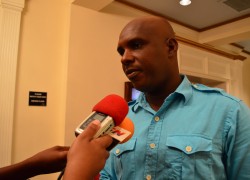
The Christie administration plans to bring new legislation to parliament that will address how the local fisheries industry is governed.
Government officials are now seeking feedback from industry stakeholders, many of whom took part in a National Validation Workshop at the British Colonial Hilton yesterday.
The draft Fisheries Act is a framework law that makes provisions for certain regulations within the industry.
Officials were quick to point out that it does not automatically address well-known issues like closed seasons, overfishing and boundaries.
The proposed legislation seeks to establish a fisheries advisory council, a fisheries stakeholder forum and a specific fisheries fund.
To help develop the draft legislation, the government enlisted the consultancy services of London-based Globe Law Group.
The company’s Director Chris Hedley explained what it took for the company to put the Act together.
“It takes quite a long time to draft a law but we have quite a bit of experience in this and we have drafted laws for countries all over the world. To get a draft up and running, it takes a few weeks. The more important aspect is the consultation and the work with the department. We have had quite a few meetings with the department. We sat down with senior staff and discussed exactly what it is. So the key job for us to make sure what is written in the paper is what the industry and what the department wanted,” he said.
Permanent Secretary Anthony McKinney spoke about the importance of getting feedback from the industry’s stakeholders.
“This initiative is designed to upgrade the existing fisheries legislation to ensure that it is relevant to the current circumstances, conditions and the current policies of the government for the advancement of the fisheries sector and to ensure that the stakeholders agree with whatever the changes are,” he said.
“That is why this validation workshop this morning involves a diversity of persons from the sector. You have businesspersons, government officials and non-governmental organisations’ representatives and so together we should be able to come out with an upgraded and improved fisheries act that should serve to better meet the needs of the stakeholders in the sector.”
Bahamas Sportfishing and Conservation Association (BSCA) President Prescott Smith told The Journal he would like the new legislation to reflect changes that would bring about more revenue for the government.
“When you look at the present regulations most of the country is the marine environment and it has the greatest areas potential for growth potential. Both associations are looking at creating greater opportunity for Bahamians but in terms of really protecting the resources as well,” he said.
“If we are depleting the conch or lobster population then we need to look at opening new fisheries that are sustainable. And so having travelled around the entire Bahamas through years in the defence force we have not scratched the surface in the fishing industry in The Bahamas. What is lacking the training programmes and infrastructure to open up fishing for red snapper in deep waters and this would create thousands of jobs for Bahamians.”
Mr. Smith said the environment should also be a factor.
“Also at the top of it is having the largest concentration of mangroves in the western world, [this] means we have to put priority to protecting our environment because it’s not just feeding us, but it is feeding people in the region,” he said.
Mr. Hedley said after the workshop, the consultants would take into consideration the stakeholders’ feedback.
He added that depending on what advice is taken from them, the consultants may have to go back to the drawing board with the proposed draft legislation.


